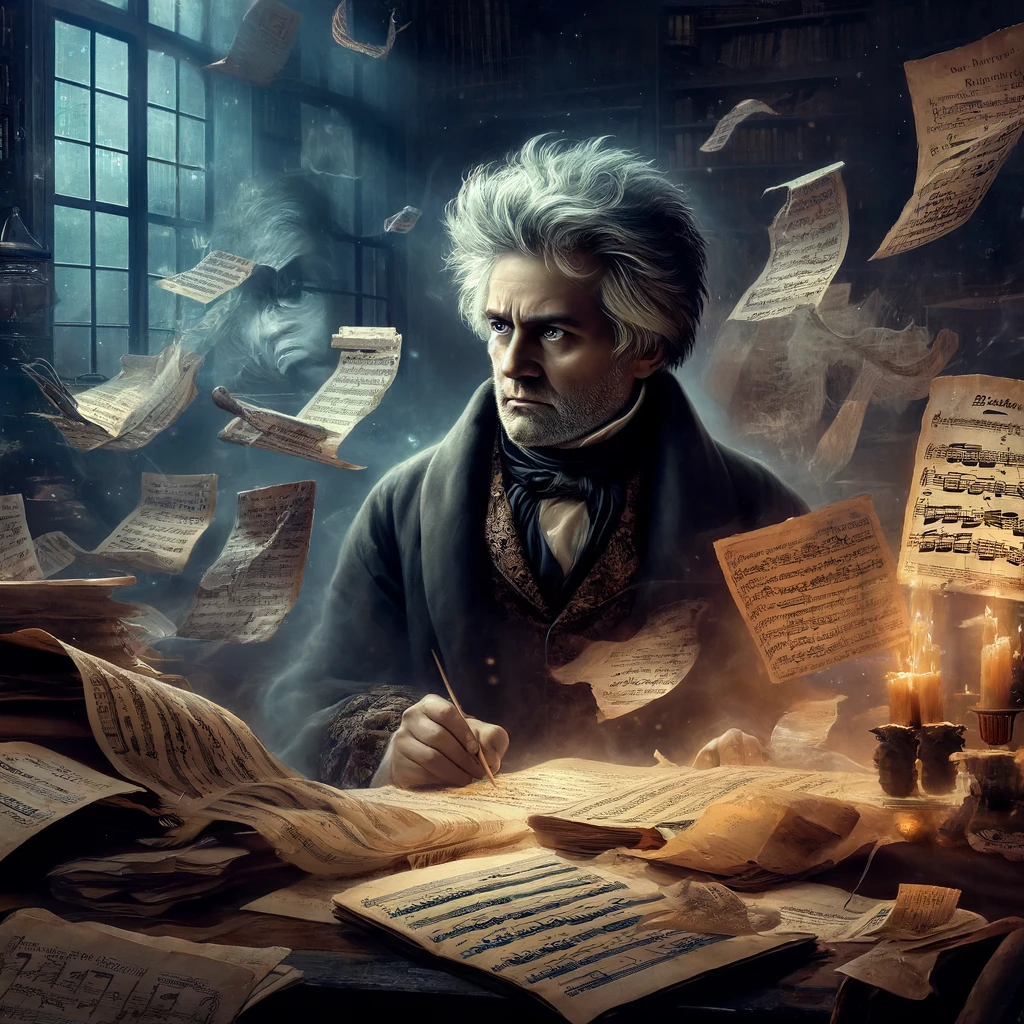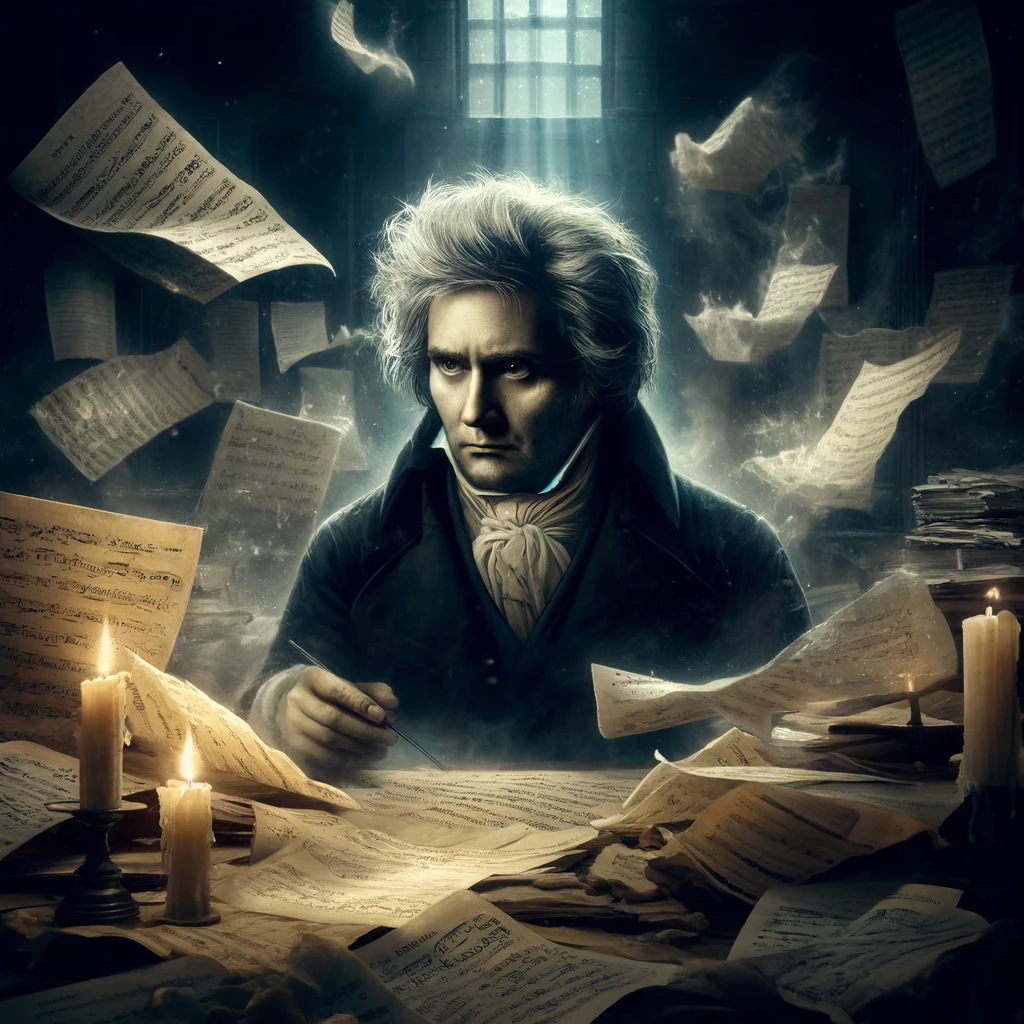
Beethoven’s Lost Works: Enigmas & Possibilities
Ludwig van Beethoven, a titan in the world of classical music, has influenced countless musicians and composers with his expansive body of work. Yet, amidst his famous symphonies, sonatas, and concertos, there exists a shadowy narrative of his lost works—pieces that were either never finished or whose manuscripts have disappeared over the centuries. These enigmatic works offer a tantalizing glimpse into what could have been and provide a deeper insight into Beethoven’s creative struggles and triumphs.
The Mysterious Case of the Lost Oboe Concerto
One of the most intriguing lost pieces is Beethoven’s Oboe Concerto, believed to have been composed around 1793. The concerto was reportedly written for the oboist of the Elector of Cologne’s orchestra, but no copies of the score have survived. Scholars often rely on secondary accounts and the memories of contemporaries to piece together its existence. The loss of this concerto is particularly poignant as it represents a unique chapter in Beethoven’s early compositional career, hinting at his experimentation with wind instruments.
The Enigma of the “10th Symphony”
Beethoven’s symphonies are monumental achievements, but did he attempt a 10th Symphony? Debate among music historians is rife, with some suggesting that sketches found after his death indicate preliminary work on another symphony. These fragments suggest that Beethoven was considering new musical directions and innovations that could have redefined the symphonic form once again. The potential insights into Beethoven’s evolving style and his response to increasing deafness are lost with the incomplete sketches.
The Missing String Quartets
Beethoven’s late string quartets are lauded as some of his most profound work, pushing the boundaries of musical expression. Reports from his contemporaries suggest that there were possibly other quartets or fragments that Beethoven had started but never completed. The reasons range from his deteriorating health to dissatisfaction with the musical ideas he was developing. The loss of these works deprives us of what could have been groundbreaking additions to the string quartet repertoire.
The Disappearance of the “Bagatelles”
Not all of Beethoven’s compositions were grand symphonies or complex sonatas. He also wrote smaller, more intimate pieces known as bagatelles. While many of these delightful piano pieces survive, some mentioned in letters and journals have never been found. These works, often overlooked, could provide further insight into Beethoven’s daily musical thoughts and explorations, showcasing his versatility and spontaneity as a composer.
The Lost Operas
Beethoven’s sole opera, “Fidelio,” was a result of immense labor and multiple revisions. However, there is evidence that Beethoven considered other opera projects. Sketches and notes suggest he was engaging with various librettos, yet these operatic ambitions never materialized into complete works. Understanding what Beethoven could have developed in the operatic form offers a window into his narrative capabilities and his potential impact on dramatic music.
Impact and Speculation
The mystery surrounding these lost works has spurred both regret and fascination among musicians, historians, and enthusiasts. Each lost piece could have offered new understandings of Beethoven’s artistic evolution and a deeper appreciation of his challenges and achievements. The fragments and anecdotes that hint at these lost compositions fuel speculation about the directions Beethoven might have explored further, enriching the already complex tapestry of his legacy.
What Could Have Been
The allure of “what could have been” in Beethoven’s oeuvre is a powerful narrative. These lost works represent more than just historical footnotes; they symbolize the fragility of art and the sometimes capricious nature of its preservation. They also remind us that Beethoven, like any artist, was perpetually in a state of becoming—always reaching, striving, and, in some cases, failing to realize his visions.
Ludwig van Beethoven’s lost works tantalize us with their potential to further illuminate the mind of a musical genius. While we mourn their loss, we also celebrate what remains—a vast collection of works that continue to inspire and challenge. The enigmas of his incomplete or missing compositions only add to the mystique of a figure whose music transcends time and continues to resonate deeply with audiences around the world.

Beethoven’s Sketchbooks: A Glimpse into the Creative Process
Beethoven’s extensive sketchbooks provide the most tangible insight into the compositions that never reached completion. These sketchbooks are filled with snippets of melodies, harmonic experiments, and sometimes barely decipherable scribbles that hint at Beethoven’s rigorous work ethic and his relentless pursuit of musical perfection. The sketches are a testament to a mind that was never at rest, always searching for the perfect expression of a musical idea. They offer a rare glimpse into the process of a genius, laying bare his frustrations and his triumphs.
The Influence of External Circumstances
It is important to consider the external influences that contributed to the loss of many of Beethoven’s works. The turbulent times, marked by political upheaval in Vienna, affected Beethoven personally and professionally. His deteriorating health, particularly his deafness, undoubtedly influenced his productivity and perhaps led to the abandonment of certain projects. Moreover, the lack of a reliable system for preserving musical scores in the early 19th century meant that many manuscripts could have been misplaced, lost in transit, or discarded as irrelevant.
Rediscovery and Reconstruction Efforts
In recent years, there has been a renewed interest in reconstructing these lost works, albeit from mere fragments. Musicologists and composers have attempted to piece together incomplete scores, using Beethoven’s existing works as a guide to fill in the gaps. While these reconstructions may not fully capture the original intentions of Beethoven, they do offer a fascinating “what-if” scenario, allowing us to experience a piece of history that would otherwise remain silent.
The Psychological Impact
The loss of these works also invites speculation about the psychological impact on Beethoven himself. Known for his fiery temperament and profound emotional depth, the disappearance or incomplete state of his compositions could have added to his frustrations and sense of isolation. This speculation not only humanizes Beethoven but also enriches the narrative of his struggles against personal and professional adversities.
Educational and Cultural Significance
Exploring Beethoven’s lost works is more than an academic exercise; it holds significant educational and cultural value. These discussions encourage a deeper engagement with Beethoven’s music, prompting both new listeners and seasoned aficionados to explore beyond the well-trodden path of his most famous pieces. They also serve as a reminder of the importance of preserving artistic heritage and the ongoing efforts needed to safeguard such treasures from being lost to future generations.
A Living Legacy
Ultimately, the story of Beethoven’s lost works is a reflection of the enduring nature of his legacy. Each piece, whether complete or incomplete, whether extant or lost, contributes to our understanding of Beethoven as a pivotal figure in the history of music. These stories encourage ongoing dialogue about his influence, ensuring that his legacy continues to evolve with each new discovery and each reinterpretation of his music.
Conclusion
The enigma of Beethoven’s lost works continues to captivate and intrigue. As we uncover more about these pieces, either through new discoveries or through scholarly research, we add layers to the rich tapestry that is Beethoven’s musical legacy. While we may mourn what could have been, we also gain a deeper appreciation for the wealth of material he has left us. Beethoven’s lost works, in all their fragmented glory, challenge us to listen more closely, study more passionately, and imagine more vividly.